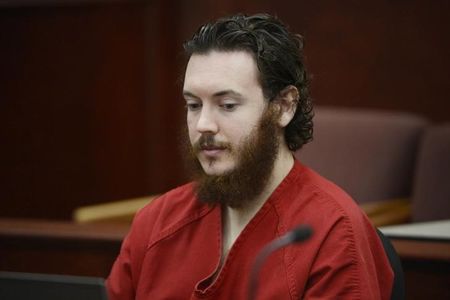By Keith Coffman
CENTENNIAL Colo. (Reuters) - A judge presiding over the Colorado theatre massacre criminal case heard arguments on Monday about whether to allow cameras at the murder trial of accused gunman James Holmes, something both prosecutors and defence lawyers oppose.
Attorneys for broadcast and print news outlets have asked Arapahoe County District Court Judge Carlos Samour to allow expanded media coverage of the proceedings, which are set to begin in December.
Prosecutors and public defenders argued that letting cameras in the courtroom could expose witnesses and lawyers to threats, intimidation, or other forms of harassment.
Samour said he will issue a written ruling by next week.
Holmes, 26, has pleaded not guilty by reason of insanity to shooting to death 12 moviegoers and wounding dozens more inside a suburban Denver cinema in July 2012 at a midnight screening of Batman movie "The Dark Knight Rises."
Public defenders have conceded the former neuroscience graduate student from California was the lone shooter, but say he was in the throes of a psychotic episode at the time.
Prosecutors have charged Holmes with multiple counts of first-degree murder and attempted murder, and have said they will seek the death penalty if he is convicted.
Shackled and clad in maroon prison garb, and for the first time in court wearing eyeglasses, Holmes swiveled in his chair during the 90-minute hearing but did not speak.
Samour said that, whether he allows cameras or not, the trial is bound to attract widespread attention, and he said witnesses should prepare themselves.
"Either way, there is going to be a ton of publicity," the judge said.
Prosecutor Lisa Teesch-Maguire said some witnesses have already been harassed by reporters, conspiracy theorists and others. Samour noted that occurred at the same time as pretrial hearings, most if which have not permitted cameras.
Representing the media organizations, lawyer Steven Zansberg said cameras have been allowed into Colorado courts for 30 years and that their presence has never once caused a mistrial.
Holmes' public defender, Kristen Nelson, argued that cameras have never been allowed in a death penalty case in the state.
"The primary purpose of this trial is not to entertain or educate the public," Nelson said.
Samour took umbrage at the suggestion by lawyers from both sides that letting in cameras would create a media spectacle.

"These proceedings have not been a circus," he said.
(Reporting by Keith Coffman; Editing by Daniel Wallis and Sandra Maler)
